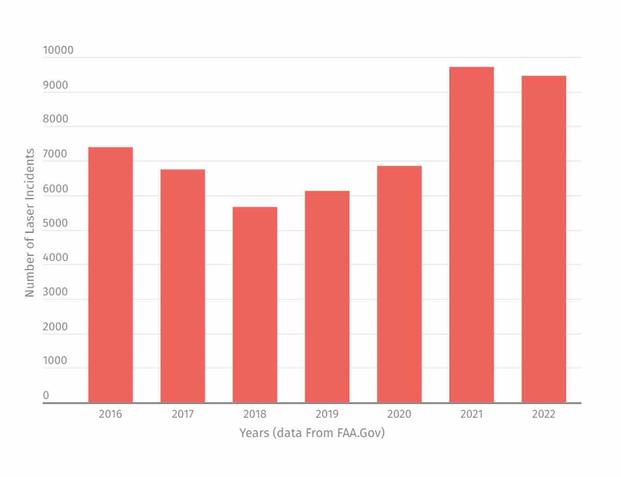Air Force investigators are raising the alarm over a significant increase in laser pointers being aimed at aircraft, with more than 9,000 incidents reported last year alone.
Personal laser pointers, small beam projectors used for everything from professors during college lecture presentations to motivating your cat to exercise at home, can cause serious damage to a pilot’s eyesight and result in distractions for aircraft, according to a press release from the Air Force’s Office of Special Investigations this week.
According to data from the Federal Aviation Administration, there was a surge in reported laser incidents, with 2021 marking a 41% increase in aircraft laser strikes compared to 2020. In 2022, there were almost 9,500 incidents reported. And in 2023, so far, more than 7,400 incidents have been recorded with nearly three months still left in the year.
Read Next: The 5 Top Concerns of Army Families — and What the Service Plans to Do About Them
“These are not harmless pranks. There’s a risk of causing permanent visual impairment,” an OSI Center official said in the press release. “From the public’s standpoint, misusing lasers can severely impact a person’s ability to see and function.”
The small, hand-held lasers can often point a beam at an object from thousands of feet away. When a laser reaches an aircraft cabin or cockpit, it can cause temporary disorientation, blindness or even long-lasting optical damage.
There have been several incidents of lasers being aimed at military aircraft in recent years.
In 2019, The Associated press reported that Air Force officials at North Carolina’s Pope Army Airfield raised concerns following two separate incidents where planes were targeted with laser pointers. That same year, someone pointed a laser at an Air Force C-17 Globemaster III when it was coming in for a landing at Charlotte International Airport in North Carolina.

While many of the cases are pranksters or citizens playing around with their hand-held pointers, the Pentagon has warned of more serious interference from other nations, too.
In 2018, the U.S. government protested to China about several incidents in which military planes were targeted with lasers while landing in Djibouti. The Pentagon reported at the time that two Air Force crew members received minor injuries during one incident. Officials requested China to investigate.
“Firing lasers at aircraft can blind aircrew members during critical moments of landing,” the Pentagon said in a statement at the time. “In the incident where the minor injuries occurred, a C-130 was landing at the base when it was painted by a laser beam. The aircraft managed to land safely, and the two aircrew members are recovering.”
The Federal Aviation Administration has “the authority to impose civil penalties, with fines escalating to $11,000 per violation and $30,800 for multiple incidents,” the OSI said in its press release.
Individuals caught pointing lasers at civilian or military aircraft and charged criminally can also face fines of as much as $250,000 and up to five years in prison.
But locating the individuals responsible for pointing a laser at an aircraft isn’t an easy task, involving witnesses and evidence, as well as communication from the pilots and crew with local law enforcement.
“The challenge is not just in reporting the incident,” Air Force Office of Special Investigations officials said in the press release. “What makes it actionable is the pilot’s ability to specify, with a degree of certainty, a geo-coordinate from which the laser originated.”
The OSI encourages individuals who witness laser strikes to report the incident to it as well, “regardless of whether the aircraft is military or civilian.”
This year and last, there have been several cases in which individuals received federal punishment for pointing a laser at an aircraft.
In April, a federal judge sentenced a Minnesota man to two years in prison for pointing a laser at a Delta Air Lines jet in 2021.
— Thomas Novelly can be reached at [email protected]. Follow him on Twitter @TomNovelly.
Related: Laser Pointers Interfering with US Marine Pilots Flying in Okinawa






